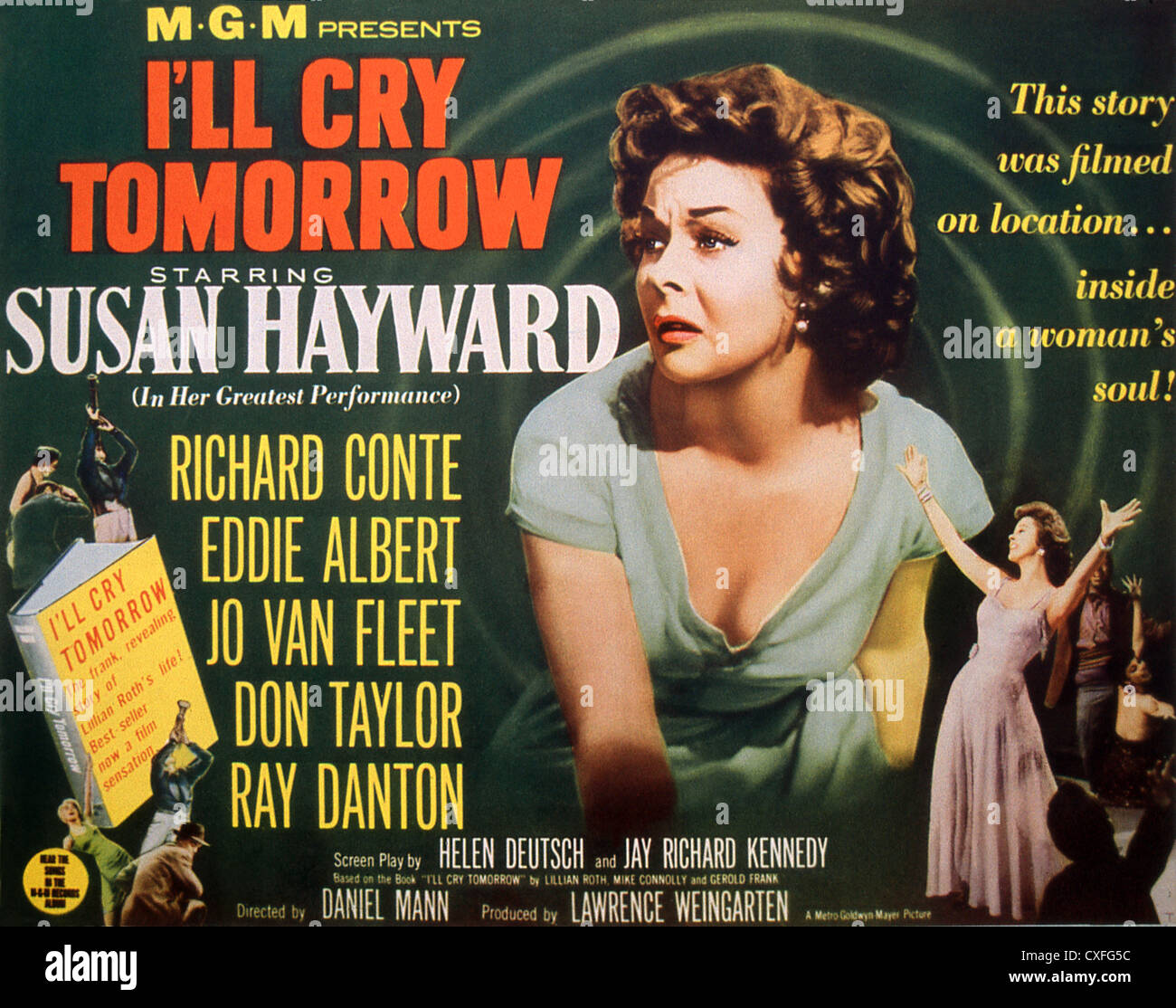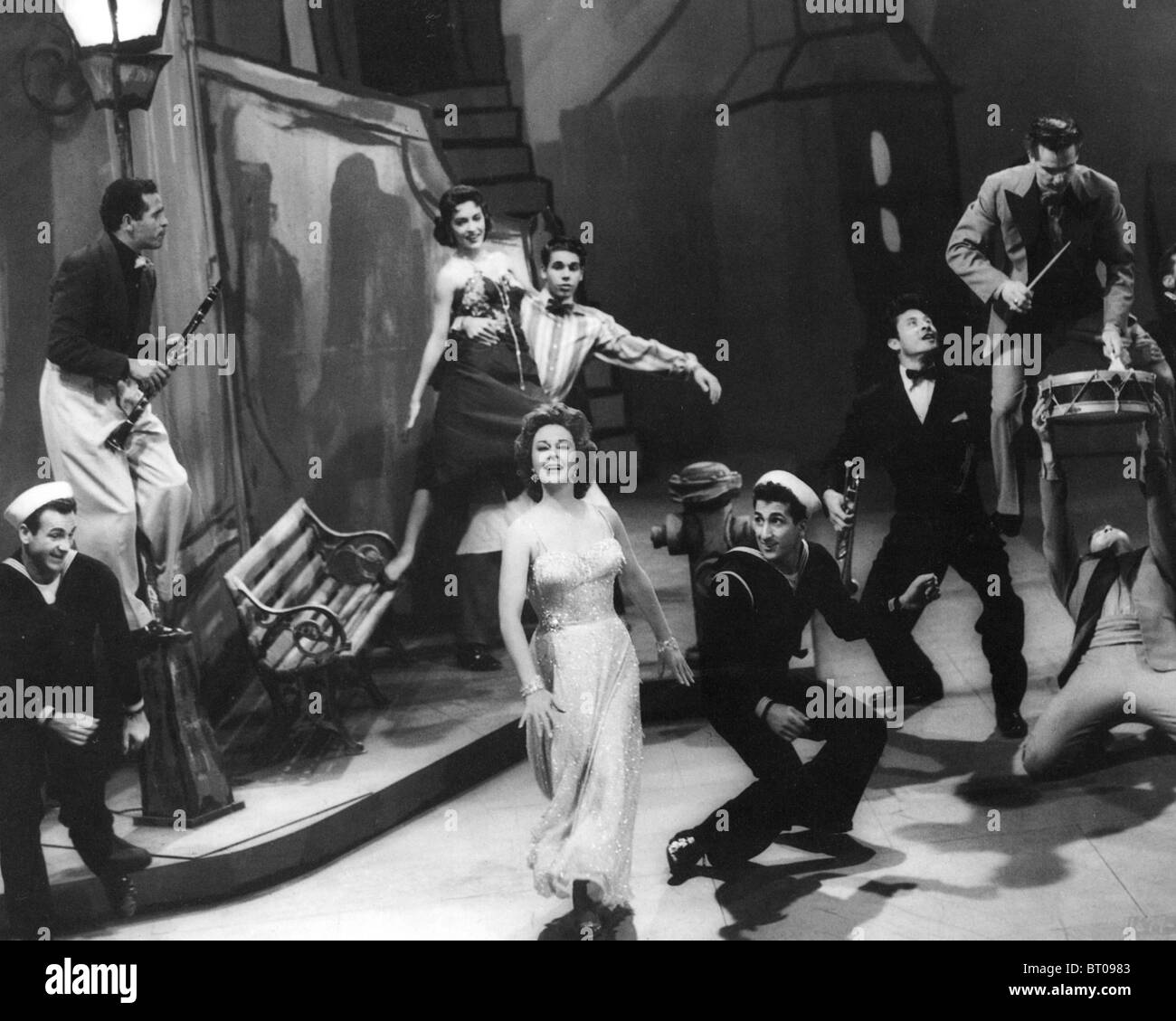← Back to Reviews
in
I'll Cry Tomorrow
An explosive, Oscar-nominated performance by Susan Hayward makes the 1955 melodrama I'll Cry Tomorrow worth a look.

This alleged biopic of singer and Broadway star Lillian Roth opens with a glance at her childhood, a shy young girl pushed into show business by an aggressive stage mother (Jo Van Fleet) who has decided that her little girl is going to be a star whether she wants to or not. Lillian does become a star but her personal life is a mess, courtesy of alcoholism and some really miserable luck with men.

Director Daniel Mann and screenwriters Helen Deutsch and Jay Richard Kennedy have concocted what is allegedly a biography of a great movie star, but is really a highly stylized melodrama and commercial for Alcoholics Anonymous. This is another one of those biopics, like Funny Girl, which pretty much throws the facts aside for the sake of entertainment and on that level, this totally works, but if you're really interested in learning about the life of Lillian Roth, this is not the place to look.

However, if you're looking for a stylish, old-fashioned melodrama with a melodrama experts behind and in front of the camera, no need to look further. Mann's direction is a little heavy-handed and the horrors of alcoholism are driven home with a sledgehammer, but there are some pretty accurate messages about the disease that ring quite true. There's a scene in a hotel room where a drunken Lillian, unable to stop drinking, decides to jump out a window but can't do it. This is the core of what drives most alcoholics to seek help...to paraphrase Jerome Kern, they're "tired of livin' and scared of dyin."

Susan Hayward received her fourth Oscar nomination for her powerhouse performance in the starring role, a melodramatic tour-de-force that riveted this reviewer to the screen, despite Mann's overheated concept of alcoholism. Richard Conte was impressive as an abusive con man who Lillian marries and Eddie Albert scores as the man who helps Lillian get sober and this does bring up one minor nitpick with the film's depiction of AA: We learn that Eddie Albert's character, Bert, becomes Lillian's sponsor, but IRL AA, men only sponsor men and women only sponsor women, but I let it go. It's concept of alcoholism as a disease is over-the top, as is Alex North's music, but Hayward is divine and will keep you watching. And yes, Hayward does her own singing.
An explosive, Oscar-nominated performance by Susan Hayward makes the 1955 melodrama I'll Cry Tomorrow worth a look.

This alleged biopic of singer and Broadway star Lillian Roth opens with a glance at her childhood, a shy young girl pushed into show business by an aggressive stage mother (Jo Van Fleet) who has decided that her little girl is going to be a star whether she wants to or not. Lillian does become a star but her personal life is a mess, courtesy of alcoholism and some really miserable luck with men.

Director Daniel Mann and screenwriters Helen Deutsch and Jay Richard Kennedy have concocted what is allegedly a biography of a great movie star, but is really a highly stylized melodrama and commercial for Alcoholics Anonymous. This is another one of those biopics, like Funny Girl, which pretty much throws the facts aside for the sake of entertainment and on that level, this totally works, but if you're really interested in learning about the life of Lillian Roth, this is not the place to look.

However, if you're looking for a stylish, old-fashioned melodrama with a melodrama experts behind and in front of the camera, no need to look further. Mann's direction is a little heavy-handed and the horrors of alcoholism are driven home with a sledgehammer, but there are some pretty accurate messages about the disease that ring quite true. There's a scene in a hotel room where a drunken Lillian, unable to stop drinking, decides to jump out a window but can't do it. This is the core of what drives most alcoholics to seek help...to paraphrase Jerome Kern, they're "tired of livin' and scared of dyin."

Susan Hayward received her fourth Oscar nomination for her powerhouse performance in the starring role, a melodramatic tour-de-force that riveted this reviewer to the screen, despite Mann's overheated concept of alcoholism. Richard Conte was impressive as an abusive con man who Lillian marries and Eddie Albert scores as the man who helps Lillian get sober and this does bring up one minor nitpick with the film's depiction of AA: We learn that Eddie Albert's character, Bert, becomes Lillian's sponsor, but IRL AA, men only sponsor men and women only sponsor women, but I let it go. It's concept of alcoholism as a disease is over-the top, as is Alex North's music, but Hayward is divine and will keep you watching. And yes, Hayward does her own singing.
